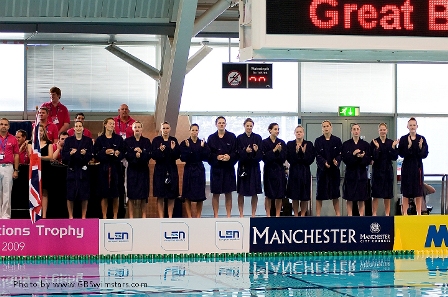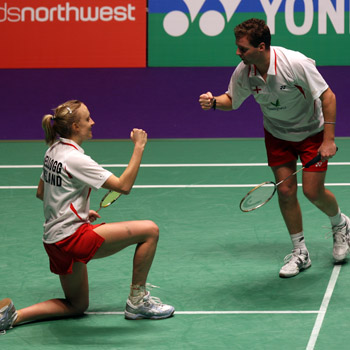
Manchester branding on the poolside
World-class development: Manchester’s events strategy
In recent years elite athletes have beaten a path to Manchester where the city council has determined that legacy can be achieved following major games. The Leisure Review followed in their footsteps.

Manchester branding on the poolside
The Leisure Review met Yawar Abbas of Manchester City Council’s events team in the newly refurbished coffee bar of the national squash centre as national team players and school children mixed easily around reception. Through a plate-glass wall the indoor track was being used by three or four coaches and their charges, while at neighbouring tables elite performers were in deep discussion with members of their support staff. The atmosphere, like Abbas himself, was relaxed but purposeful and there was a sense of being at the centre of a world characterised by professionalism and progress. Despite the bulk of the City of Manchester stadium, clad in its tenant’s sky-blue livery, dominating the foreground, a regional-quality athletics centre tucked around the corner and British Cycling’s gold medal factory at the velodrome just a short walk away, we started with the sport of swimming.
In April 2008 Manchester played host to swimming’s world short course championships but not at the purpose-built Commonwealth Games aquatics centre. Instead the partnership responsible for bidding to host the event used a venue more used to Boyzone, Disney on Ice and local boys Elbow: the MEN Arena. Abbas admitted that it was “a ridiculous thing to try and do”. Reflecting on the complex and challenging project, Abbas says, “The story of that was as interesting from an architectural point of view and in terms of engineering as it was sporting.” Short course swimming, which takes place in a 25 metre pool, is the poor relation of Olympic events (swum over the long course of 50 metres) and receives far less attention. Abbas explained how this challenge became an opportunity: “To attract attention to an event, to do something iconic. Take the Barcelona Olympics and the diver, one of the most iconic images of sport. No one is particularly interested in diving but that guy diving with the city in the background is the enduring image of the Games. So we built a pool in the middle of the MEN Arena.”
Obviously homework had been done, even down to a detailed plan of how to dispose of the heavily chlorinated tankful, but the project was attended by uncertainty with no one quite sure what effect the weight of the tank, the water and then the swimmers would have on the venue’s concrete floor; and below (“We didn’t want millions of tons of water spilling out into Victoria Station!”). However, the result was a televised showpiece drawing the eyes of the world and a full house every night, some of who were local youngsters. Abbas explained the process of involving children who might never have been to the international-quality concert and events centre: “The first people who swam in the pool were local school-kids. We had a gala that was chaotic but fantastic and we knew we were creating memorable opportunities for kids from the city and that’s key to what we do.”
The number of school-aged young people using the building we were in suggests that the city’s attempts to integrate local people, particularly children, with the international venues in their midst. “We’ve grown that idea,” Abbas said. “When we first offered tickets for the world swimming championships we simply offered 5,000 tickets to local schools. We didn’t pay for the transport; we put the offer out there, where it was, when it was and divided the costs up. The MEN Arena were great. They really helped and we got some really good experiences for Manchester school kids and kids from the region.” The council did the same for the world squash championships, the Paralympic world cup and most recently the world netball series, where the atmosphere was absolutely phenomenal. For a man with, by his own admission, little knowledge of netball Abbas is enthusiastic about the sport in its recently developed more accessible format. Shorter periods of play, fewer restrictions on who can do what and power plays, coupled with 5,000 school children “who were absolutely high as kites on candy floss and chocolate” relishing the packaging of music and pyrotechnics clearly impacted on Abbas. “I’ve not been to many better events,” he said.
It is clear that Manchester City Council are committed to their strategy of bringing major events to their city with a programme of over 30 events in their budget. Abbas’s role is to ensure that the council’s interests are met within each event in terms of “branding, legacy activities, access for school children, coach education opportunities, press coverage; everything that comes out of an event.” But how does it actually work? Abbas used the forthcoming Yonex European badminton championships as an example. “There is a number of partners we work with commonly across major events. The city council and the governing body would usually initiate an event. From there the regional development agency would be involved and UK Sport. The north west development agency would look at tourism, economic impact, visitor numbers and promoting the region. UK Sport will look at the performance side and, taking the badminton event as an example, make sure our badminton team get quality competition with the advantage of a home venue. Beyond that, given that we are due to host the biggest event in the world in 2012, sports need to be able to host that and administer it, referee and officiate at it. Hosting major events in the build up to London 2012 and Glasgow 2014, plus World Cup 2018, rugby union 2013, will all need a volunteer workforce and an officials workforce that has been upskilled by the hosting of major events. UK Sport look to achieve that.”
Returning to the council’s rationale for supporting the Yonex-sponsored event, Abbas went back to basics, to the grass roots: “In Manchester we have a badminton development programme, a development officer who works across the city and we have a number of coaches who work alongside that officer so we are hopefully enhancing the opportunity for residents of Manchester to get involved in sport and the opportunity for kids to visit the MEN Arena and see the best players in Europe.” The integration of events with development programmes and the focus on providing life-enhancing opportunities for the community are clear benefits to the major event programme and Manchester is building an enviable reputation as the nation’s foremost sporting city but at a cost? Abbas was straightforward about explaining where the funding that makes it all possible comes from. “We would usually look to be a deficit funder,” he said. “We would expect a bid to come to us showing a financial commitment from the proposer in which there is a gap that we can plug and then we put our brand on that.”
One of the key decisions that meant the staging of the Commonwealth Games in 2002 left an ongoing legacy for the people of Manchester was in the creation of ‘waterfall funding’. Abbas explained: “The buy-in of the football club [Manchester City] as tenants of the stadium means this area is visited by 40,000-plus people every couple of weeks so immediately businesses benefit from that footfall. But in addition one principle of the deal was that when the football club came here they pay a rental charge but on top of that when they achieve attendances in excess of what they could achieve at Maine Road [their former ground] there is a kick-back to the city.” And it is that funding, the waterfall, that has been identified to develop sport across the city, particularly those on the Eastlands site, athletics, tennis and squash. So what is a negligible amount to football ends up funding, as Abbas put it, “a whole development programme for athletics or for squash in the local area”.
Current thinking is that the true legacy of the London Olympics and events like it lies in advance of the event itself and that waiting for the events to happen to generate a huge boost to participation is foolhardy. But in Manchester there is clear evidence of a continuing and consistent legacy from the 2002 Commonwealth Games, a result of the way Sport City, as a piece of real estate, has been managed. What message would Manchester have for London? “The intelligent use of the facilities,” Abbas said. “The philosophy of how you run the facilities is key to getting the usage right. My first job post Commonwealth Games was to work with governing bodies’ world-class performance departments, and school and club users as well as the public. How you balance the programme to service all those users is key to getting the main benefits.”
As if on cue behind us a group of young middle distance runners begin their warm-up as an older sprinter winds down his session on starts and coaches arrive to set up for a club session. The same pattern is replicated throughout Sport City and beyond as real people of all ages, from recreational users to elite athletes, share fantastic facilities. Bringing world and European events to Manchester is bringing elite sport to the grass roots and bringing long-term benefits to individuals and to the their communities. How cool is that?
The Leisure Review, April 2010
© Copyright of all material on this site is retained by The Leisure Review or the individual contributors where stated. Contact The Leisure Review for details.
Download a pdf version of this article for printing
